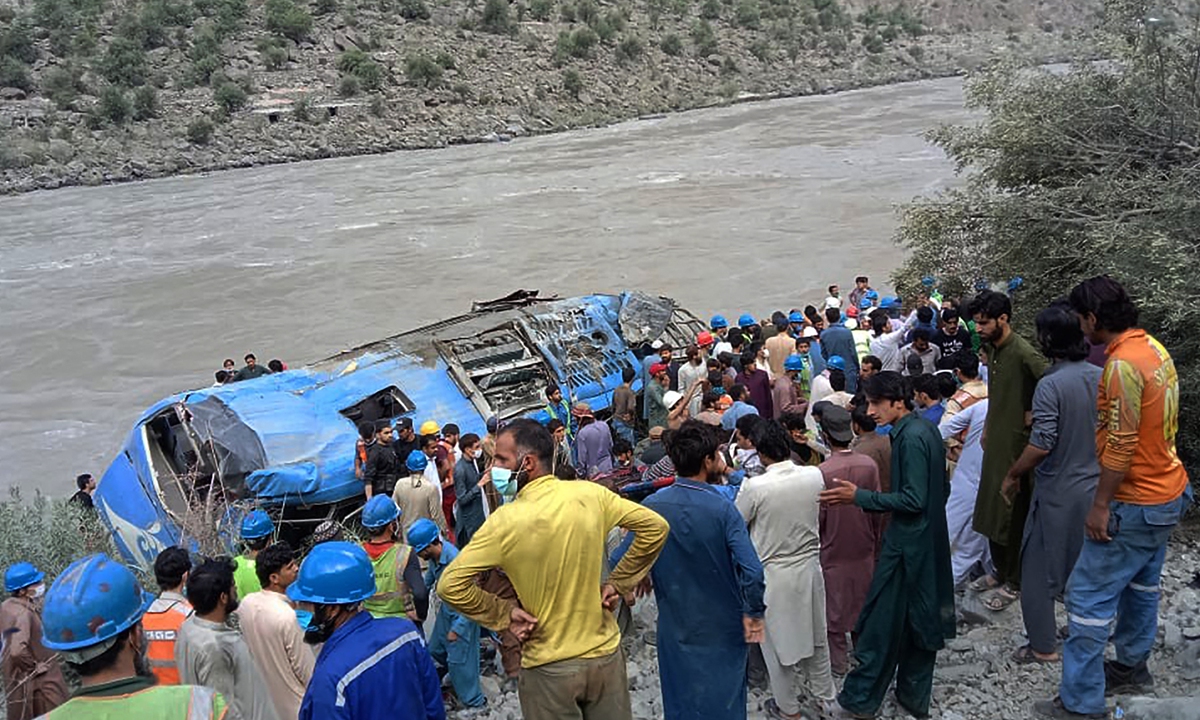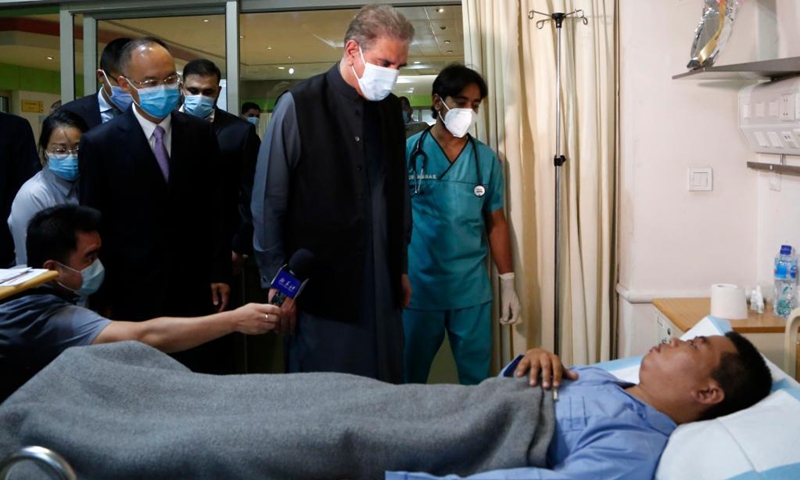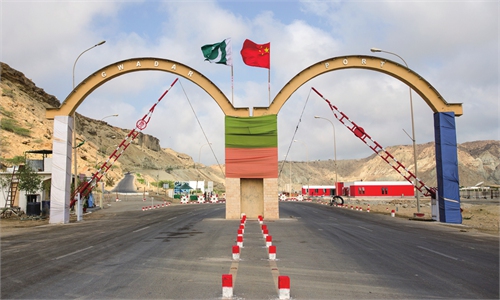Truth on Dasu terror attack surfaces amid unanswered questions, as China and Pakistan step up security for Chinese

Photo: AFP
After Pakistan announced its preliminary investigation results Thursday that the Pakistani Taliban was responsible for the Dasu terror attack that killed nine Chinese on July 14, and pointed at Indian and Afghan intelligence agencies involved, the truth seems to start to surface.
However, some questions remain unanswered, including the role of different forces behind the tragedy. The intertwined bilateral and multilateral relations among India, Pakistan, Afghanistan and China, and the presence of extremist and terrorist forces all complicated the situation in Central Asia, in which China's interests have frequently been put in a delicate position.
A Chinese Foreign Ministry spokesperson urged Pakistan to ascertain the truth and hold culprits accountable, expressing opposition to any force that uses terrorism to seek geopolitical gain.
The attack on a bus in northern Pakistan that killed nine Chinese nationals was a suicide attack carried out by a branch of the Pakistani Taliban backed by Indian and Afghan intelligence agencies, Pakistani Foreign Minister Shah Mehmood Qureshi said on Thursday.
India's intelligence agency Research and Analysis Wing (RAW) and Afghanistan's intelligence agency National Directorate of Security (NDS) were behind the Dasu terror attack, according to the probe carried out into the incident, Qureshi said.
Following the revelation, Chinese Foreign Ministry spokesperson Hua Chunying said late Thursday that Pakistan's investigation into this terrorist attack has seen major progress in a short period of time and China pays great attention to the matter and expresses appreciation to Islamabad's efforts.
Further investigation by Pakistan is still ongoing, and China and Pakistan will follow the important consensus reached by the leaders of both sides, ascertain all the facts and truth, and hold the culprits accountable and bring them to justice, Hua said, noting that the two countries will keep strengthening security cooperation mechanisms to ensure the safety of Chinese projects, people and institutions in Pakistan.
"China firmly opposes any force that uses terrorism to seek geopolitical gains, and calls on countries in the region to cooperate in eradicating all terrorist organizations and uphold common security and development interests of all countries," Hua said.
Nine Chinese nationals were killed in a shuttle bus explosion in Pakistan's Khyber Pakhtunkhwa province on July 14 on their way to the China-invested Dasu hydropower project. The incident was later confirmed to be a "terror attack" when Chinese Premier Li Keqiang held a phone call with Pakistani Prime Minister Imran Khan.

Pakistani Foreign Minister Shah Mahmood Qureshi (C) visits the injured Chinese national from the Dasu terrorist attack at the Combined Military Hospital in Rawalpindi of Pakistan's Punjab province on July 18, 2021. Pakistani Foreign Minister Shah Mahmood Qureshi on Sunday visited the injured Chinese nationals from the Dasu terrorist attack at the Combined Military Hospital in Rawalpindi near the federal capital Islamabad. Photo: Xinhua
Complexity beneath
Pakistani Foreign Minister Qureshi said during the Thursday press conference that "Afghan soil was used for the attack, and the vehicle used was smuggled into Pakistan." Fourteen people were involved in the attack that was headed by a person named Tariq who is a member of proscribed Tehreek-e-Taliban Pakistan (TTP) and the attack was carried out by the Swat chapter of the TTP, according to local media.
TTP comprises of tribal militants scattered in Pakistan who have no subordinate relationships between them. They each take actions against the Pakistani government and claim to be TTP to show they are not alone. The Swat chapter is one of the tribal militants that goes against the Pakistani government, Li Wei, an expert on national security and anti-terrorism at the China Institute of Contemporary International Relations, told the Global Times.
Swat is a district of Khyber Pakhtunkhwa province, which is near the Afghan-Pakistan border and was seized by the TTP in 2007. The Dasu terror attack happened in the Kohistan region in northern Pakistan where Pakistani Taliban is based and has close contacts with terrorists in Afghanistan, Qian Feng, director of the Research Department of the National Strategy Institute at Tsinghua University, told the Global Times.
In April 2009, Pakistani government launched an operation targeting terrorists in Swat and killed several hundred of its members, but some fled and hid in other places, bringing uncertainties to the anti-terrorism situation, Qian noted.
The Kohistan region where the Dasu terror attack happened is near Kashmir region and due the region's high mountains and precipitous paths, terrorist organizations are hard to eliminate completely, and the Pakistani government also has weak control in the province with the Pakistani Taliban based here.
But the TTP has not claimed responsibility for the Dasu attack, which is unlike most previous events and is strange, Qian said, noting that it also unveiled the complexity beneath the terror attacks.
In a telegram message sent to a Reuters reporter, the TTP denied it carried out the attack. No further comment has come from the Afghan government as of press time on Friday.
Intelligence agencies behind
Pakistani Foreign Minister Qureshi said on Thursday that India's RAW and Afghan NDS have been involved in the Dasu attack, noting that attackers have been trained in Afghanistan and some suspects have been arrested and others are in Afghanistan.
Experts reached by the Global Times said that India's intelligence agency RAW was set up in September 1968 and is the biggest intelligence agency in South Asia. It conducts activities widely in Nepal, Pakistan, Sri Lanka, Bangladesh and Afghanistan and has been engaged in shameful activities of sabotaging, assassinations and supporting dissidents with notorious reputations.
The RAW sometimes embarrasses the Indian government for bypassing it to conduct secret activities, experts noted.
Wang Shida, deputy director of the South Asia, Southeast Asia and Oceania Research Institute of Contemporary International Relations Research Academy of China, noted that the security situation in Pakistan has been improving with casualties from terror attacks decreasing; however, such attacks targeting Chinese have been increasing.
"This abnormal phenomenon showed that we cannot rule out the possibility that some countries in the region are using terrorism for geopolitical purposes," Wang told the Global Times.
Wang said that in recent years, the smooth progress of the China-Pakistan Economic Corridor (CPEC) and the achievements it has brought may worry some other regional countries that do not want to see further development of China-Pakistan cooperation in areas such as politics, economy and security. To prevent further cooperation, they may financially support Pakistani terrorists to attack Chinese and undermine the relationship between the two countries.
In response to Pakistan's conclusion, some mainstream Indian media criticized the statement as discredited. "It is not new for Pakistan to engage in baseless propaganda," Times of India quoted a July statement by Indian Ministry of External Affairs spokesperson Arindam Bagchi in its coverage of the Dasu terrorist attack on Friday.
This is not the first time that Pakistan has accused India as being the black hand behind terror attacks in Pakistan. In November 2020, Pakistan's Foreign Minister Qureshi told a press conference that they were presenting irrefutable evidence to the UN to demonstrate India's direct sponsorship of terrorism in Pakistan.
In June 2020, four gunmen attacked the Pakistani stock exchange in Karachi, and the Baloch Liberation Army claimed responsibility afterwards. Pakistan's national security advisor then accused India's intelligence agency of orchestrating the terror attack.
Long Xingchun, senior research fellow with the Academy of Regional and Global Governance at the Beijing Foreign Studies University and president of the Chengdu Institute of World Affairs, said that Pakistan came to the conclusion that India's and Afghan intelligence agencies were involved in the Dasu attack, but India would not admit their involvement given there is not yet enough evidence offered by Pakistan and the two used to have mutual recriminations on such cases.
Given the ties among China, Pakistan and India, it is possible in theory that India may find agents to attack Chinese people involved in China-Pakistan cooperation projects, but India is also aware of the huge risks this would bring, Long said.
The Afghan intelligence agency, which was built by the US, may not fully be under the control of the Afghan government but may listen to the US and India, Long noted.
However, Li noted that there are many difficulties that lie with an intelligence agency that hopes to guide the Swat chapter in Pakistan to attack Chinese. The case is still under investigation with more questions to be answered and more evidence is needed before a conclusion is made, Li said.
Given the matter's complexity, China should be prudent when looking at the investigation on the Dasu attack as probes are still ongoing and more evidence is needed, Zhu Yongbiao, director of the Center for Afghanistan Studies in Lanzhou University, told the Global Times.
Geopolitical situation
Analysts noted that too many forces may be involved in the Dasu terror attacks and each party has its own geopolitical purposes. For example, the Indian government is close to the Afghan government and they both have bitter ties with Pakistan; Afghan Taliban and the TPP are two independent forces that also have some links; and the deteriorated situation in Afghanistan has made all the relations even more delicate.
Wang said that a large number of representatives from the Afghan government are members of the Northern Alliance, a military and political organization that has India's support. After 2001, India-Afghanistan ties grew fast and India had interfered deeper in Afghanistan's politics, economy and other areas.
For the past two decades, India has invested huge amounts of money in Afghanistan, exceeding $3 billion, on infrastructure projects such as roads, dams, schools, hospitals and substations. It also has one embassy and four consulates in Afghanistan.
Pakistan has also questioned India's interference in Afghanistan and said India is using the consulate in Jalalabad on the Afghan-Pakistan border to support anti-Pakistani organizations, Wang noted.
The expert warned that war and chaos are rich soil for terrorism. The flames of war raged across Afghanistan and there are a large number of anti-Pakistan organizations hidden in it. Once the situation deteriorates, more international and regional terror organizations may sneak into Pakistan to attack the Pakistani government and they may also target China.
Qian said that the complexity beneath the Dasu attack also showed that extremist terrorists in Afghanistan have contacts with terrorists in South and Central Asia, and with the escalation of domestic wars in Afghanistan, more terrorists and organizations may conduct activities, which would pose big worries for neighboring countries. China-India ties will be affected if Pakistan's conclusion is proved accurate.
Pakistan's conclusion on the Dasu terror attack comes against the backdrop that the Afghan Taliban has taken more territory in Afghanistan in the last two months than at any other time since they were ousted from power in 2001.
Despite neighboring countries, such as China and Pakistan, working hard to promote intra-Afghan talks as its domestic security situation continues to deteriorate, the Dasu terror attack in Pakistan may create new frictions among all parties and undermine the unity and joint efforts in promoting the peace process in Afghanistan, Zhu said, noting that China has maintained good communications with the Afghan government and Afghan Taliban.

